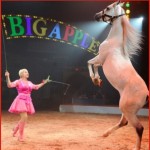 Brandon M. Graham is an educator and author of A Love Supreme: Amputated Feelings & Prosthetic Apologies (Brownstone Publishing, Inc., 2005), as well as the forthcoming collection of poetry entitled Conciliation: Medicine for Melancholy (Brownstone Publishing, Inc. 2011).
Brandon M. Graham is an educator and author of A Love Supreme: Amputated Feelings & Prosthetic Apologies (Brownstone Publishing, Inc., 2005), as well as the forthcoming collection of poetry entitled Conciliation: Medicine for Melancholy (Brownstone Publishing, Inc. 2011).
He’s also a friend; once upon a time we team taught a professional development course at New School University.
We chatted online recently, and discussed the career path that has led him to become the published poet he is today. Our conversation took twists and turns, uncovering references to Russian literature, growing up with ministers, and wetting himself while writing.
The full interview follows, with very minor edits:
Haig Chahinian: When you were 12, what did you want to be when you grew up?
Brandon M. Graham: I remember wanting to be both a professional athlete and a writer of some sort. I wasn’t too versed in genre, but I know I loved playing sport and writing in my journal.
HC: What kind of athlete? And that’s quite a mix! Did you share this with anyone at that time?
Graham: As a kid I played organized football, basketball, and track. My parents and coaches have always been really encouraging. I think I had a natural aptitude for playing football. I idolized players like Walter Payton and Jerry Rice. Also, I did share it with my teachers, coaches, and classmates. I wasn’t necessarily ashamed about wanting to be a writer and surely I wasn’t ashamed of wanting to be a professional athlete. I think those thoughts of anxiety toward keeping a journal and writing crept in when I began high school.
HC: In professional football, what did you want in that line of work? Fame? To crush other ballplayers? Fortune? The poetry of a perfect spiral viewed by millions? And what did writing in your journal feel like to you? It seems like you felt something significant, because you thought about pursuing writing professionally. (And tell me to slow down if we’re going too fast.)
Graham: That’s funny you would use that language because really early on I found the poetry and symmetry in sport. I had always been a running back when I played football. I noticed the kind of choreography of a football play. You have eleven men going up against eleven other men–and that can both violent and exhilarating. However, the overwhelming feeling I walked away from each play was just how amazed I was that we were all in sync. So I really enjoyed teamwork and collaboration with others on the field. The fame and money and all that comes with being a professional athlete was all secondary. (OK, forgive if I’m typing too slow. I’ll do my best to keep up, but just be a little patient with me and we’re all good man. This is cool.)
HC: So you were a thinker from an early age. Both of these avenues — professional sports and professional writing — are hard to find success in! What happened in high school, where I hear you say anxiety crept in? How did that happen? For example, was it completely internal? Or perhaps there were external forces at play?
Graham: The journal was significant. It was both deeply personal and at the same I felt a universal connection because I knew millions, if not billions, around the world were doing the exact same thing in keeping a journal. It was also very therapeutic. I think at a young age there are so many inner emotions and external pressures being exerted on you that a journal or diary is helpful. It allows one to dump out their feelings onto a sheet of paper–or now computer or tablet–and then begin to examine it with a little distance.
HC: You felt a belonging to the world community of young journal writers. Now, I’m working to understand how you were influenced. From where did you receive the message as a young person that you had feelings, which were valid? Enough to spend the energy to chronicle them, you know?
Graham: What happened was I encountered Russian literature and I began to question my motives, my upbringing, and I felt the anxiety of entering a new social space called high school. So, I think the anxiety, which wasn’t overwhelming at all, was both external and internal. I’m grateful for that kind of social pressure because it gave me pause and allowed me, even as young man, to stop and think about what it was that I wanted to pursue in high school. I quickly found that I still had a deep love for literature and athletics. The binding element between the two, literature and athletics, was the art of performance. I quickly realized that a football game on Friday night was a performance. I was indeed on stage. I also joined the drama club and found my way onto the stage in my freshmen year of high school, and to some degree I haven’t left the stage.
HC: Writing as performance? Tell me more. How is writing performance, as you experience it?
Graham: I also grew up in a church community. My parents were ministers and are ministers to this very day. So watching a preacher give a sermon was very much like watching an actor give a Shakespearean soliloquy. I was able to synthesize the element of performance in both, and happened to gravitate more toward the secular. I found comfort outside of the church, among people who were questioning everything and experimenting with everything. They, and I dare say we, were questioning: our existence, god, sex, drugs, music. You name it and we were questioning and attempting to find the logic in it.
HC: Did your parents encourage your writing? Your athletics? Your work with the drama club? It also sounds like you had a rebellious streak in you, naturally. And you weren’t afraid to exercise it.
Graham: Also, I think high school is naturally a heightened state of emotions. It’s almost like a John Hughes movie because a break up means so much and kisses mean even more. And one can get validation rather quickly in high school. Get a good grade on a test, and one garners the respect of both teacher and classmate alike. Score 19 touchdowns, become an All-State running back, get your name and picture in the newspapers and girls want to date you. Everything is heightened when you are on stage.
HC: I’m still thinking about writing as performing, and maybe I’m understanding that what you write, you write with the performance in mind? Your current career includes speaking, or perhaps is it more performing, in front of high school and university students? Btw, were you an All-State running back?
Graham: My parents encouraged my writing. My father and mother bought me both my first typewriter and my first electronic typewriter as a kid. It meant, and in many ways still does mean, the world to me. That encouragement from not only my parents, but my siblings and my church community, was in fact overwhelming. It wasn’t usual to have 30-50 people in a section cheering my brother, a year older than I, and myself. And my mother loved that I was involved with the drama club and taking drama courses for credit. She had always had a fascination with television, cinema, and entertainment. I think I did have a bit of a rebellious streak in me, but I daresay it was a strong sense of curiosity and exploration–academically, socially, culturally, and sexually.
HC: In high school you were involved in athletics, literature, writing, and performing. What did you study as an undergraduate? And how did your professional interests evolve in college?
Graham: Writing for me is both very introspective and performance. I like initially to collect my thoughts, frame the poem, and then begin to pour, if you will, it out of me. And that pouring, perhaps even more of a purging, is both intellectual and physical. I like to stand up and write at my desk or speak it out so that I can hear and try to find where the words all fit together. And to steal a quote from Patti Smith, she says about writing that, “I don’t consider writing a quiet, closet act. I consider it a real physical act. When I’m home writing on the typewriter, I go crazy. I move like a monkey. I’ve wet myself, I’ve cum in my pants writing.”
HC: Oh damn.
Graham: Yeah, I was All-City (Waterbury, CT), All-League (Naugatuck Valley League), and All-State (CT). And currently I probably feel most comfortable calling myself a writer. Mainly, because I write poems, essays, articles, and I also write the script for our speaking engagements, which do have a large element of improvisation. However, I do like form and truly believe in form. Look, if it was good enough for Seneca then I think I’ll give it shot as well. Lol.
HC: That’s funny, although I don’t have a quick witty line to offer about Seneca.
Graham: Lol
HC: Bring us through your undergraduate years — you remained interested in writing and literature? While becoming a superstar athlete on campus. And anything else? Not that there has to be.
Graham: Sorry, as an undergraduate, I studied both English with a focus on writing and business administration with a focus or concentration on strategic management. My professional direction evolved mainly due to having the ability to explore and gain some career clarification. I began writing for my school newspaper. I wrote for the Arts and Entertainment section. I also contributed to our university’s English journal as both a writer and later on as Poetry Editor. Other interests included going to lectures outside of the classroom, performing in coffeehouses, and traveling both in the States and abroad.
HC: Business! Superficially, it may seem unrelated to what we’ve been discussing. You were exploring entrepreneurial options? Strategic management suggests you are interested in leadership.
Graham: I think you’re spot on with your assessment. Business was about exploration and perhaps gaining additional skills that I thought might someday tie into my entrepreneur interests. And leadership has been rooted in me since I began playing organized sports. I have always been team captain.
HC: Earlier you were describing what writing can look like physically for you. Thinking about revealing and engaging your self at work — what so you summons within you when writing a poem?
Graham: I suppose it is a summonsing of sorts. What I’m trying to do is extract all that is creative and contradictory inside of me. And usually what is inside of me is quite a bit of cinema, literature, interviews, and conversations with friends. So I’m attempting to bring all of that which is subconscious to my conscious state, which inevitably presents a problem of sorts. So the hours spent at the desk daily are about craft and about problem solving in that I am hoping to translate that which was unconscious to a conscious that is both entertaining but most of all challenging.
HC: Brandon you’ve shared an intimate glimpse into your development as the professional you are today. And I feel we are only scratching some of the surface. Still, I’m totally grateful for your time and thoughtfulness in reflecting on your career trajectory. I hope we can continue this conversation in the not very distant future. Perhaps you’ll be a guest on Career Talk Live?
So I’ll say thank you, and good night, for now.
Graham: Awesome. Thank you. Good night.
Photo by Steven Duarte. Used with permission.



